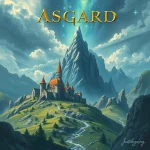
You say inside your introduction it’s Ragnarok — the fateful fight that ends the gods — that made these tales stick inside your mind. Can you explain that?
The greatest reason happens because it turns the whole factor right into a tragedy, which provides it depth, it provides it base notes, it provides it a peculiar profundity. Additionally, it implies that it might be immediate, while you find out about Ragnarok you could predict of the question and go, "Is the fact that happening now? Will it happen?" The gods, even in their funniest, you will know this really is awaiting them … after i would be a kid, that fascinated me.
Most Armageddon scenarios, the New Testament Armageddon scenarios, you might have lots of angels fighting one another, but nobody states "After which God will die, battling Satan, and they are both likely to tumble in to the pit, and individuals will have to determine how to proceed by themselves,Inch which may be really rather interesting, and you are not considering that. However the Norse, you’re — here’s Odin wiped out, fighting the wolf. Here’s Thor, wiped out through the Midgard serpent. Here’s Heimdall and Loki, who’ve always hated one another, finally falling in fight with one another. Which adds a kind of very peculiar depth towards the entire operation.
The factor that stuck to me, studying this, was you discuss all of the missing pieces — and so i possess the dreaded two-part question: That which was it like using this disjointed mass of tales with all of these missing pieces and putting it into a story? And just what missing piece do you want most was there?
Most of us have of those wonderful goddesses — there’s Sjöfn and there is Vör — and the concept that you’d a physician from the gods, I believe, with regards to the giant listing of missing pieces, may be the one I’ve found most fascinating of. I would like to browse the story — it’s as though all the tales which are lost are women’s tales. They are all tales about goddesses, by which goddesses have agency, and also you go, "They need to happen to be there, because listed here are all of the goddesses." And I don’t think that the ladies … didn’t tell these tales. But we do not have them.
Another a part of your real question is, that which was interesting in my experience was picking tales when i went that felt like they put into the narrative, and felt like these were all about this slow walk to doomsday. And felt like, when I left them out, you would not get quite exactly the same experience. There have been some place I’d consider the story and I’d go, this can be a great story but it is somewhat too rapey, does not quite work for the entire factor — or it’s the same as another factor.
I felt like I heard a few of the rhythms of the writing as well as your dialogue in certain of what the gods were telling one another. The amount of you is within these tales?
Many of the local color and also the detail is me — I finished up quite frequently researching how things labored in Viking occasions, going, "Okay, we all know we have the actual builder and also the horse, but exactly how did you apply the horse to obtain large blocks of stone from the quarry towards the place you are building?" and finding, ah, you utilize a stone boat. It’s a lot like a sled. … And also the dialogue was me — and often letting the dialogue be funny was me too.
I really like the truth that a magazine such as this has been read, has been adopted. When you begin retelling myths, and also you go, "Okay, I am going to try and retell them precisely and faithfully as well as in my very own words, there is no be certain that anybody’s likely to be interested. … And That I love that individuals love it, that they are really going "No, we are really thinking about these items.Inch And That I love the strange method in which individuals are going, "This feels peculiarly highly relevant to today."
Resourse: http://npr.org/2017/02/13/514557427/
Neil Gaiman: Norse Mythology and American Gods
Video COMMENTS:
Loke Odinson: 13:19 Great story, heard a longer version as a child
7: I've loved Neil's works ever since my high school English teacher gave me a copy of sandman junior year!
Corin Miyuki: I enjoyed this immensely
JOHN SMITH: I used to read Fantastic! and Terrific!

